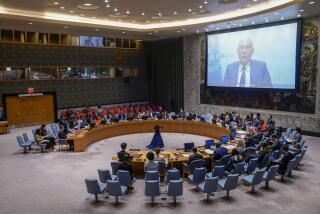Quayle Stresses N. Korea Military Threat
- Share via
SEOUL — Praising South Korea’s “political transformation and movement toward democracy,” Vice President Dan Quayle emphasized the military threat posed by North Korea and soft-pedaled concerns over continuing human rights violations in the south as he met Wednesday with government and opposition party officials.
“The North Korean military establishment is larger than ever,” Quayle told members of the Korean Newspaper Editors Assn. in a speech.
In particular, he said, Moscow in the recent has strengthened North Korea by sending it advanced aircraft. The rationale for the continued presence of U.S. troops here, he said, “is as strong as ever.”
South Korea was the first stop on a four-nation tour of Asia that will also take Quayle to Japan, the Philippines and Malaysia before he returns to Washington next week. Before leaving today for Tokyo, Quayle plans to visit the demilitarized zone between the two Koreas to review U.S. and South Korean troops.
Quayle’s tone here reflected the Bush Administration’s policy of avoiding public confrontation with other nations over human rights issues as well as his own deep suspicion of Soviet military intentions. Although U.S. Embassy officials have expressed private concern over the human rights situation here, the Administration has carefully avoided any public criticism of President Roh Tae Woo and his government.
Roh, Quayle said in his speech, has “successfully ushered in democratic reforms” and shown “moderation in the face of radical violence that seems designed to provoke overreaction.”
Korean opposition leaders have questioned that moderation, charging that in recent months Roh’s government has turned toward a more repressive course. They cite figures made public Tuesday by a committee of the Korean National Assembly that show a sharp increase in arrests under the country’s strict National Security Act.
Indicted Opposition Leader
In addition, the government last month indicted Kim Dae Jung, the nation’s best-known opposition figure. The indictment, which Kim has vehemently denounced, charges that he failed to report an opposition legislator’s trip to North Korea and received money from the legislator that the traveler had received from North Korean agents.
Quayle sidestepped that issue in meetings with Roh, Kim and other Korean leaders. U.S. officials said that Roh assured Quayle that he “would not turn back” toward the repressive policies of past South Korean governments.
“The vice president was happy about that,” spokesman David Beckwith said.
Although complaints of a government crackdown have been a major part of the opposition’s political program, neither Kim Dae Jung nor Kim Young Sam, the other main opposition leader, raised the issue directly during their meeting with Quayle at the National Assembly.
Kim Dae Jung criticized past U.S. policies, saying that in the past the United States “put security too much ahead of Korea’s democratization,” according to a Korean official who briefed reporters after the meeting. The U.S. government had alienated many South Koreans by its “support for dictatorial regimes of the past,” the official quoted Kim as saying.
But both Kims emphasized their support for the presence of 43,000 U.S. troops here. Any move to reduce the U.S. force at this point would be “unproductive,” Kim Young Sam told Quayle.
Beckwith said that Quayle was “surprised by the unanimity” of opinion on the troop-strength issue.
South Korean government officials have expressed considerable anxiety over the possibility of a troop cut, repeatedly asking Quayle about proposals in Congress for such a move. The Bush Administration opposes reducing troop strength here and, for now, the idea appears to have relatively little support in Congress.
More to Read
Get the L.A. Times Politics newsletter
Deeply reported insights into legislation, politics and policy from Sacramento, Washington and beyond. In your inbox twice per week.
You may occasionally receive promotional content from the Los Angeles Times.











